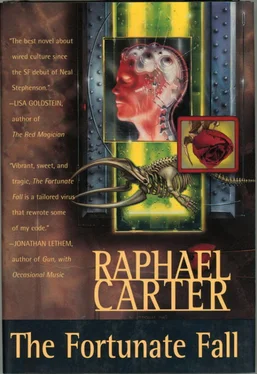Raphael Carter - The Fortunate Fall
Здесь есть возможность читать онлайн «Raphael Carter - The Fortunate Fall» весь текст электронной книги совершенно бесплатно (целиком полную версию без сокращений). В некоторых случаях можно слушать аудио, скачать через торрент в формате fb2 и присутствует краткое содержание. Город: New York, Год выпуска: 1996, ISBN: 1996, Издательство: Tor Books, Жанр: Киберпанк, на английском языке. Описание произведения, (предисловие) а так же отзывы посетителей доступны на портале библиотеки ЛибКат.
- Название:The Fortunate Fall
- Автор:
- Издательство:Tor Books
- Жанр:
- Год:1996
- Город:New York
- ISBN:0-312-86034-X
- Рейтинг книги:3 / 5. Голосов: 1
-
Избранное:Добавить в избранное
- Отзывы:
-
Ваша оценка:
- 60
- 1
- 2
- 3
- 4
- 5
The Fortunate Fall: краткое содержание, описание и аннотация
Предлагаем к чтению аннотацию, описание, краткое содержание или предисловие (зависит от того, что написал сам автор книги «The Fortunate Fall»). Если вы не нашли необходимую информацию о книге — напишите в комментариях, мы постараемся отыскать её.
“Gripping…. One of the most promising SF debuts in recent years”.
—“Publisher’s Weekly” starred review
The Fortunate Fall — читать онлайн бесплатно полную книгу (весь текст) целиком
Ниже представлен текст книги, разбитый по страницам. Система сохранения места последней прочитанной страницы, позволяет с удобством читать онлайн бесплатно книгу «The Fortunate Fall», без необходимости каждый раз заново искать на чём Вы остановились. Поставьте закладку, и сможете в любой момент перейти на страницу, на которой закончили чтение.
Интервал:
Закладка:
“That’s ridiculous,” I said to Voskresenye, my voice betraying the fear I felt. “The Weavers wouldn’t do something like that, even if they wanted to. And they wouldn’t want to. They hate Guardians and Guardianism—everybody knows that.”
“They allow people to hate the Guardians a judicious amount. Just enough that no one will try to emulate them. Not enough that someone might begin to think the Army was justified.”
“We’re here to talk about the Guardians, not the Weavers. What you’re saying is completely off the subject.”
“But they are all one subject,” Voskresenye said. “I warned you what would happen if you persisted in pulling up tangler webs, Maya Tatyanichna. The Guardians brought about the Army, and the Army caused the Weavers; you will never understand them until you consider them together.”
“The Weavers,” I said desperately, “protect us from something like the Army happening again. Do you want a Net full of mind control viruses?”
“Assuredly not,” he said. “But that is exactly what the Weavers have given us.”
Mirabara, cut this off, now! I subvoked.
No answer. But there was a quick pulse of fear from the audience—not in response to what he’d said; the timing wasn’t right. It happens sometimes with large audiences: random fluctuations in the viewers’ emotional states happen to coincide, are amplified, flow back and forth from camera to audience in waves. If the screener can’t take care of it, you’re supposed to take your camera chip out before someone gets hurt. I lifted my hand to my head.
But being on the Net was my lifeline. Keishi had said as much. And it had only been one pulse, not the harmonic oscillations that could rend a camera’s mind. It might still be all right. My hand wavered in the air, then fell.
“Oh yes,” Voskresenye continued, oblivious, “it is very easy to understand Weavers. What would you do, if you had just lived through the Army? Wouldn’t you tremble in fear that it might return—it, or something far worse than it? For be assured, Maya Tatyanichna, nothing so innocuous as the Army could prevail today. The Army’s use of human minds was about as efficient as using a Dahlak to crack walnuts; with a billion neurons at its disposal, it carved out as many as are in the brain of a rather bright ant. A modern virus, better written and more catholic in its tastes, might subvert the entire soul—and from such a state, there can be no salvation.
“Thinking such thoughts, would you not do anything it took to prevent the spread of viruses? And how can you protect the Net, without monitoring everything that goes on in it? So you create screeners to monitor cameras. And filters to monitor screeners. And Weavers to monitor filters. And locks and signatures and needle-eyes and firewalls, to keep the whole system in place. Soon you have built a celestial bureaucracy of humans and machines and cyborgs, like orders of angels.”
“All of which,” I said, “is very necessary.”
“I did not say that it was not. Many things are necessary, and yet evil, or inevitably lead to evil. I understand the temptation of Weavers; it is one beside which any apple pales. Imagine that the Net, the very world-mind, is stretched out between your hands, like a cat’s cradle. You can see every twist and tangle, every unaesthetic knot that leads to suffering. Will you stand there, and watch, and do nothing? His-Majesty-in-Chains does; but then His-Majesty is not a man, though he has a man in his heart, as you might have a seed in your stomach, or as a church might have a corpse in its foundation, or a bridge be built on bones. The Weavers are human—all too human—and they will never put themselves in chains. And so they do what you would do, what any of us would do. They move their fingers—” he mimed making a cat’s cradle “—they move their fingers, and the patterns change.”
“Everyone knows that Weavers keep things off the Net that would make people go into overload,” I said.
“Oh yes, and perhaps for a brief time they did nothing more. But observe how easy a descent it is, Maya Tatyanichna. First, viruses that control minds; certainly we don’t want those. Then, feelings so intense they might cause damage to the audience. Then, things which simply disturb people. Finally, anything which might be a bad influence—for after all, if you control the world-soul, anything that you exclude does not exist. And so the sentinel of viruses comes to control the postproduction of the human heart.” He folded his hands into a spire, and slowly brought them to his chest. “And that is where we come to your case, Maya Tatyanichna: you, and the young woman with whom you compromised yourself.”
“You son of a bitch, you just killed me.” I sprang out of my chair, and for a moment I felt I might actually hit him. “My God, you told the whole Net—”
“And what was the Net’s reaction, Maya Tatyanichna?”
I stopped short, relief flooding my body. The Net had been silent. Oh, Keishi, you just made the save of the century. When we get out of this —
“You may as well turn off that damned flashcube, Maya Tatyanichna; no one is watching. When you turned over your signal to the whale, I took the liberty of not returning it. What is going out on News One comes from me.”
Sorrow seized my throat, and my tear glands fired so suddenly it made my whole face ache. The world in my head had been plunged into grief, like a hand plunged into boiling water. Then, just as quickly, they were calm again.
“What are you doing to them?”
“Oh, nothing of consequence. Only giving them their souls back.” He looked at the chair significantly, but I remained standing. “Turn the camera back on and go to disk, if you please. This needs to be told, and I don’t want to have to trust your memory.”
Warily, I sat down across from him and lit my rune. All right, Keishi, let’s give this bastard his last words. Go to disk.
Keishi did not reply.
“What have you done with my screener?” I said.
“She has not been harmed… by me. You will see her later, I expect. Now go to disk; I have a statement.”
“Why should I cooperate with you?”
He raised his eyebrows in exasperation. “For truth, justice, and the future of humanity. And because it will prove you were just an unwitting dupe, when you toss my carcass to the Weavers.”
So it would. I set the camera chip to record onto the moistdisk, overwriting the research on whales. Whoever viewed the disk might find Voskresenye’s words surrounded by a cloud of strange cetacean associations, but then, that was only appropriate. “All right. Now I’d like an explanation for what you’ve done.”
“As I said before, your own example is most illustrative—”
I switched off my Net-rune. “What the hell do you think you’re doing? One more word about me, and this disk goes in the samovar.”
He stared at me, as if gauging my resolve. “Very well,” he said at last, inclining his head.
Warily, I turned the rune back on.
“As I said before, the Weavers have progressed through all possible stages of censorship, including many which would once have been unthinkable—such as the suppressor chip, the censorer of souls.”
His eyes strayed to my forehead; I kept my mind carefully blank.
“Do you have any idea how much different things are in Africa, where the Net is free?” he continued. “They’ve changed so much, it’s like another world. But here, here in the Fusion, things are much the same as they were fifty years ago. The Net should be the most democratic form of communication that the world has ever known. It should replace the poor bumblings of human compassion with perfect electronic sympathy—instant, universal understanding, available to everyone. It might have brought about a true and lasting peace. But instead, it is being used to enforce an official vision of humanity.”
Читать дальшеИнтервал:
Закладка:
Похожие книги на «The Fortunate Fall»
Представляем Вашему вниманию похожие книги на «The Fortunate Fall» списком для выбора. Мы отобрали схожую по названию и смыслу литературу в надежде предоставить читателям больше вариантов отыскать новые, интересные, ещё непрочитанные произведения.
Обсуждение, отзывы о книге «The Fortunate Fall» и просто собственные мнения читателей. Оставьте ваши комментарии, напишите, что Вы думаете о произведении, его смысле или главных героях. Укажите что конкретно понравилось, а что нет, и почему Вы так считаете.












